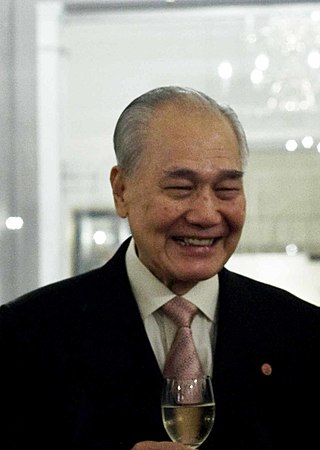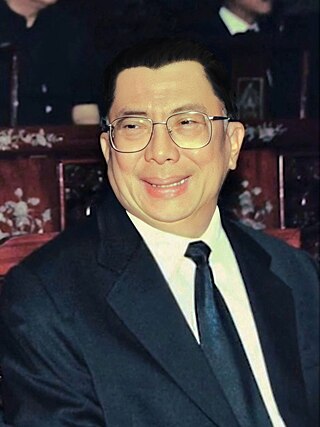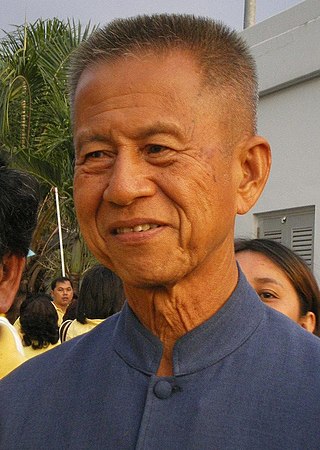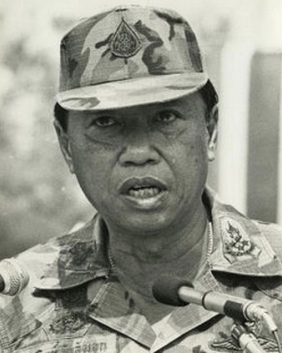
Bhumibol Adulyadej, conferred with the title King Bhumibol the Great, was the ninth monarch from the Chakri dynasty, titled Rama IX. Reigning since 1946 until his death in 2016, and is the third-longest verified reigning sovereign monarch in world history after King Louis XIV and Queen Elizabeth II, reigning for 70 years and 126 days. His reign of over 70 years is the longest reign of any Thai monarch.

Anand Panyarachun was Thailand's Prime Minister twice: once in 1991–1992 and again during the latter half of 1992. He was effective in initiating economic and political reforms, one of which was the drafting of Thailand's "Peoples' Constitution", which was promulgated in 1997 and abrogated in 2006. Anand received a Ramon Magsaysay Award for Government Service in 1997.

Field Marshal Thanom Kittikachorn was the leader of Thailand from 1963 to 1973, during which he staged a self-coup, until public protests which exploded into violence forced him to step down. His return from exile in 1976 sparked protests which led to a massacre of demonstrators, followed by a military coup.

The history of Thailand from 1973 to 2001 saw an unstable period of democracy, with military rule being reimposed after a bloody coup in 1976.

Prem Tinsulanonda was a Thai military officer, politician, and statesman who served as the Prime Minister of Thailand from 3 March 1980 to 4 August 1988, during which time he was credited with ending a communist insurgency and presiding over accelerating economic growth. As president of the Privy Council, he served as Regent of Thailand from the death of King Bhumibol Adulyadej on 13 October 2016, until the 1 December 2016 proclamation of Vajiralongkorn as King. At the age of 98, Prem was the longest-living Thai Prime Minister. He is also the oldest regent of any country, surpassing Bavarian Prince Regent Luitpold's record, when he became the regent for king Rama X. During the Thai political crisis of the mid-2000s, he was accused by deposed prime minister Thaksin Shinawatra and his supporters of masterminding the 2006 coup, as well as in the appointment of the post-coup legislature and interim government of Surayud Chulanont. The military junta that ousted Thaksin denied that Prem had any important political role. Prem, as the President of the Privy Council, promoted King Bhumibol's ideologies and royal projects, though he sometimes represented himself as being the voice of the king. He urged Thai society to follow the king's advice and himself founded several welfare projects related to education, drug suppression, poverty, and national unity. A southerner, Prem had also dealt personally with trying to resolve the South Thailand insurgency.

Black May, also known as "Bloody May", was a series of mass protests and subsequent crackdowns by security forces and police in Bangkok in May 1992. A rally of over 200,000 people led by Chamlong Srimuang was held on 17 May, caused by the extending of the military regime of Suchinda Kraprayoon, the 1991 Thai coup d'état leader. An estimated 52 to 100 protesters were killed, 696 were injured, and 175 had "disappeared" afterwards. King Bhumibol Adulyadej summoned both Srimuang and Kraprayoon on 20 May, and the Suchinda regime later received a sweeping amnesty along with other law reforms, signed by Bhumibol.

Chavalit Yongchaiyudh, also known as "Big Jiew", is a Thai politician and retired army officer. From 1986 to 1990 he was the Commander-in-chief of the Royal Thai Army (RTA), and Supreme Commander of the Royal Thai Armed Forces from 1987 to 1990. In 1990 he founded the New Aspiration Party which he led until 2002. He was Thailand's 22nd Prime Minister from 1996 to 1997. At various times he has held the positions of Deputy Prime Minister, Minister of Defence, Minister of the Interior, Minister of Labour and Leader of the Opposition.

Thanin Kraivichien is a Thai former judge, politician and law professor. He was the prime minister of Thailand between 1976 and 1977. He was then appointed to the Privy Council and became its president in 2016.

The Most Honourable Privy Council of Thailand is a body of appointed advisors to the Monarchy of Thailand. The council, as the Constitution of Thailand stipulates, must be composed of no more than eighteen members. The council is led by the President of the Privy Council of Thailand, currently occupied by former Prime Minister Surayud Chulanont since 27 May 2019. The king alone appoints all members of the council. The council's offices are in the Privy Council Chambers, Phra Nakhon District, Bangkok.

Chamlong Srimuang is a Thai activist and former politician. A former general, he was a leader of the "Young Turks" military clique, founded and led the Palang Dharma Party, served for six years as governor of Bangkok, led the anti-military uprising of May 1992, and is a prominent member of the People's Alliance for Democracy, a group strongly opposed to former prime minister Thaksin Shinawatra. Chamlong had supported the military junta that overthrew Thaksin in a coup. A devout Buddhist and follower of the Santi Asoke sect, he is now celibate, a vegetarian, and claims to have no worldly possessions. Chamlong Srimuang received the Ramon Magsaysay Award in the category of Government Service in 1992.
Pallop Pinmanee (Thai: พัลลภ ปิ่นมณี,RTGS: Phanlop Pinmani, born 25 May 1936 in Sam Phran, Nakhon Pathom as Amnat Pinmanee is a retired Thai Army general who took part in several coups, ordered the massacre of insurgents at Krue Sae Mosque and allegedly played a role in the attempted car-bomb assassination of Prime Minister Thaksin Shinawatra. After a 2006 military coup overthrew Thaksin, the military junta appointed Pallop public relations adviser to the Internal Security Operations Command of Thailand. He eventually switched sides and became an adviser to Thaksin's younger sister Yingluck Shinawatra while she was serving as prime minister.
Major General Manoonkrit Roopkachorn is a former Thai military officer, senator and President of the Senate of Thailand. A leader of the "Young Turks" clique of military officers, he took part in the coups of 1976 and 1977, in the unsuccessful coups of 1981 and 1985, and in the 2002 corruption case of Prime Minister Thaksin Shinawatra.

Arthit Kamlang-ek was a Thai general. He was the Commander-in-Chief of the Royal Thai Army from 1982 to 1986 and parallel the Supreme Commander of the Royal Thai Armed Forces from 1983 to 1986. He was particularly influential during the 1980s during the government of Prem Tinsulanonda.

The communist insurgency in Thailand was a guerrilla war lasting from 1965 until 1983, fought mainly between the Communist Party of Thailand (CPT) and the government of Thailand. The war began to wind down in 1980 following the declaration of an amnesty, and in 1983, the CPT abandoned the insurgency entirely, ending the conflict.
The year 1981 was the 200th year of the Rattanakosin Kingdom of Thailand. It was the 36th year in the reign of King Bhumibol Adulyadej, and is reckoned as year 2524 in the Buddhist Era.

The 1991 Thai coup d'état was a military coup against the democratic Chatichai Choonhavan government, carried out by Thai military leaders on 23 February. Although the figure head was Sunthorn Kongsompong, there was a military influence from military leaders, Chavalit Yongchaiyudh, Suchinda Kraprayoon, and Kaset Rojananil in the conflict. Chalerm Yubamrung, a politician, was also involved in the beginning of the conflict which began since 1990 but reached the peak in February 1991 due to a strong executive order of Chatichai. Later in May 1992, protesters calling for democracy were massacred by the military regime, known as 'Black May.'
The year 1982 was the 201st year of the Rattanakosin Kingdom of Thailand, which celebrated its bicentenary on 6 April. It was the 37th year in the reign of King Bhumibol Adulyadej, and is reckoned as year 2525 in the Buddhist Era.

Panieng Karntarat was a Thai politician and retired air force officer. He held the position of Commander-in-Chief of the Royal Thai Air Force from 1977 until his retirement on 30 September 1981 during the Cold War period.
The 1981 Thai military rebellion was a military coup attempt to consolidate power by the government of Prem Tinsulanonda, staged by Thai military leaders of Class 7 on 1 April 1981, but a counter-coup by Prem, Arthit Kamlang-ek, and support by the royal family on 3 April led to the coup's failure, turning it into a rebellion. In Thailand, it is known as the "Young Turk Rebellion", referring to the group of military officers that led the coup, or more mockingly as the "April Fools' Day Rebellion", referring to the date of the coup along with its failure. The coup attempt failed despite garnering the support of as many as 42 battalions, the most in Thai history.
The March 1977 Thai coup d'état attempt was a military coup attempt against the military government of Thanin Kraivichien and junta leader Sangad Chaloryu, by Chalard Hiranyasiri on 26 March 1977, but failed within 12 hours. Chalard was executed one month later without trial, in retaliation of the killing of Arun Thavathasin, close friend of King Bhumibol Adulyadej.












